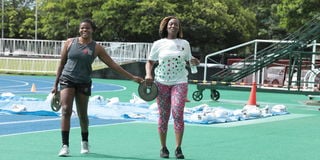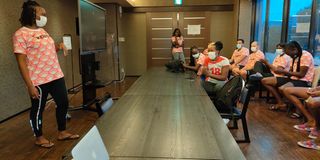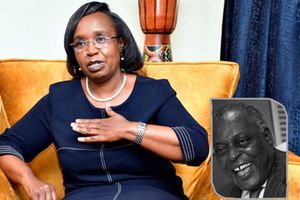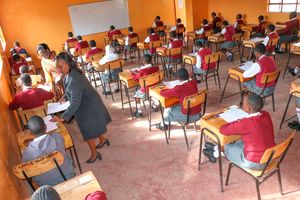Chip off the block: Sports and academics run in Ilako family

Sports scientist Kanyali Ilako (right) with national women’s sevens rugby team player Sarah Oluche during a training session at the Fukuoka Prefecture Kurume Sports Centre in Kurume City on July 19, 2021.
What you need to know:
- Former international swimmer Kanyali playing crucial role as Team Kenya’s sport psychologist.
- She believes the current arrangement ought to have come earlier, but was curtailed by, inter alia, the stigma surrounding mental health.
In Tokyo, Japan
Her father Festus Ilako was an accomplished Kenya national tennis player and administrator, and her brother Edward Ilako a world class swimmer.
In fact, her brother set several records in US collegiate swimming competitions while studying to be an engineer at Florida Tech University in sunshine state.
But Kanyali Ilako has pretty much charted her own course, though, most obviously, sport runs in the Ilako family with Kanyali herself having represented Kenya as a swimmer for over 10 years.
Currently an assistant manager of elite sports at the Kenya Academy of Sports, Kanyali is Team Kenya’s Sports and Performance Psychologist attached to the team here in Japan.
A Master’s Degree holder in psychology, Kanyali has very much been able to juggle books and sport, just like other members of her family.
Her father Festus, a former flight surgeon at the Department of defence, is a clinical gastroenterologist with a Master’s degree and bias towards neurogastroenterogy, and her mother a professor of ophthalmology at the University of Nairobi.
Kanyali’s services have been handy to the various teams during the national bubble camp at Kasarani and also the pre-Olympics training camp in Kurume City.

Team Kenya sports psychologist Kanyali Ilako talks to Malkia Strikers at the team’s training camp in Kurume City on July 15, 2021.
Especially the women’s rugby team that has had to endure the psychological torture of having half the squad in quarantine having been in contact with a Covid-19 positive case on their flight to Tokyo.
The players needed the psychosocial support which Kanyali has been able to help provide as part of an elite panel of experts set up by the National Olympic Committee of Kenya (NOC-K) in March this year.
“My role as a sports psychologist is to help the athletes with a variety of their mental skills training as well as their psychosocial support and well-being, considering that this is a very interesting Olympics (because of Covid-19).
“It’s important that the athletes are taken care of physically but also mentally – we need a holistic care of our athletes and support staff as well.”
Kanyali sees some quick wins since the pool of elite experts were put together by NOC-K in March.
“I feel that the athletes are now open to and understand the importance of the different aspects of their sports, and the necessity of training yourself mentally, physically, nutritionally… It’s been positive.”
She believes the current arrangement ought to have come earlier, but was curtailed by, inter alia, the stigma surrounding mental health.
“The coronavirus may have been a negative aspect, but it has also brought about the importance of awareness and bringing up the discussions around mental health, not only looking at physical well-being, but also mental health.”
Is it a one-size-fits-all approach for Kanyali?
“Not at all. Every mental skill is sports specific. For example, for sports such as shooting, or archery, you would require a lot more concentration tactics and for sports like rugby or volleyball you require a lot more arousal strategies.
“Also within the sports, the athletes are very different. What may work for one athlete may not work for another.
“It’s a build-up of things and I’m happy that I’ve been able to work with them from March, just to understand the sport, the team and also the individuals.”





